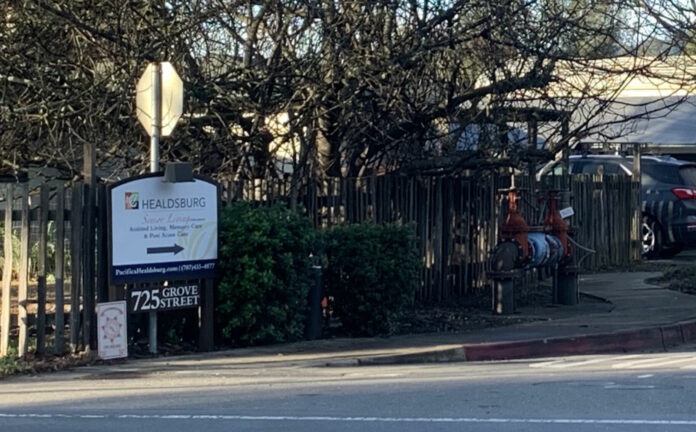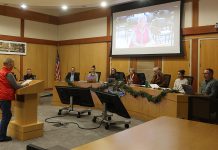A recent survey conducted by the California Department of Public Health (CDPH) found around a total of 31 deficiencies in care at Pacifica Healdsburg Senior Living’s skilled nursing unit.
In one instance, the survey found that the facility failed to ensure its residents freedom from abuse, neglect and exploitation when a male resident repeatedly exhibited inappropriate sexual behaviors toward female residents. The facility failed to implement an adequate supervision program to address the resident’s sexual behaviors, resulting in an “immediate jeopardy” to the unit residents.
The skilled nursing unit also has had several instances of inappropriate handling of residents, including being rough with one resident and verbally disrespecting another.
The recertification survey also found — through requested documents and several interviews with facility staff — that the facility failed to ensure infection control practices and failed to follow their COVID-19 mitigation plan after a COVID exposure took place.
Additionally, in many cases several residents were not provided with a safe and comfortable environment, according to the survey findings.
According to the Centers for Medicare & Medicaid Service’s operations manual, “immediate jeopardy represents a situation in which entity noncompliance has placed the health and safety of recipients in its care at risk for serious injury, serious harm, serious impairment or death.”
A total of 31 egregious deficiencies in care were identified in the comprehensive, 180-page survey, and the document shows a lengthy history of issues in care spanning several months.
There were 19 residents in the unit when CDPH started the survey on Nov. 15, 2021. The survey was completed on Nov. 23 and was conducted by five CDPH health facilities evaluator nurses and one health facilities evaluator supervisor.
The information in the survey was gathered through requested documents, site observations, and countless interviews with residents, residents’ family members and facility staff and administrators.
Following the survey results, the Centers for Medicare & Medicaid Services (CMS) Center for Clinical Standards and Quality/Quality, Safety & Oversight Group terminated the skilled nursing unit’s Medicare/Medicaid funding on Dec. 6 due to the facility failing to rectify two immediate jeopardy situations that were identified.
As a result of the funding loss, the skilled nursing unit is being closed on Jan. 15, and the unit’s residents are being asked to find alternative facilities. As of Jan. 10, the skilled nursing unit has 12 residents.
“The decision to close the facility was a difficult one made in the best interest of the existing residents. We are working with the state to find an appropriate facility to relocate the remaining 12 residents in a nearby facility. We expect that to be a smooth transition that is complete prior to the end of January,” according to a Pacifica statement sent to SoCoNews from Pacifica Senior Living Regional Director of Operations Leslie Quintanar.
Looking at the first immediate jeopardy – Issues of sexual behavior
One of the skilled nursing unit residents, a male who is identified as Resident 20 in the report, has a history of inappropriately exposing his genitals around female residents and fondling non-consenting individuals, according to CDPH interviews and record reviews.
During a review of Resident 20’s “Behaviors Monitoring Record” dated August 2021, the record said that Resident 20 had 10 instances of exhibiting inappropriate sexual behavior throughout the month of August, two instances in September (although there were 17 instances of missing or blank documentation), 10 instances in October (although there were six instances of missing or blank documentation), and eight instances in November.
Resident 20’s “Plan of Care” indicated that he also had inappropriate behavior of grabbing a female resident’s hand to stroke his genitals in the dining room. The plan also indicated that he would touch and fondle non-consenting peers.
Despite the known and documented behavioral issues with Resident 20, facility staff failed to address the problem and residents continued to be exposed to his improper sexual behavior with the potential for female residents to be sexually abused, according to the survey.
Resident 20 was admitted to the skilled nursing facility on May 10, 2021 following a stroke.
During CDPH surveyor interviews with facility staff and residents, it was revealed that he had an ongoing issue with sexual behavior and during an interview with one licensed staff member, she stated she thought the behavior was getting worse.
The same staff member told the survey takers that she thought Resident 20 was going to be transferred to a board and care facility, but after the Pacifica social services director quit there was no follow up.
According to the survey, Resident 20’s plan of care regarding the inappropriate behavior was to have a staff member check on him every 15 minutes and document his whereabouts and if he were to exhibit his behaviors he would be wheeled back to his room and the curtain would be drawn.
However, there were several instances where the resident was left unobserved and by himself for 11 minutes at a time and in one instance on Nov. 22, there was no staff at all providing monitoring in or outside Resident 20’s room.
The resident’s plan of care had been updated earlier in July to include, “assisting Resident 20 to develop more appropriate methods of coping and interacting and encouraging Resident 20 to express his feelings appropriately. The plan of care had included new interventions dated July 19, 2021 indicating the family and caregivers would educate Resident 20 on successful coping and interaction strategies.”
The plan also indicated that the resident would need active encouragement and support to use the new strategies.
According to the CDPH survey, a staff member said in November that Resident 20 has a history of talking about sex and touching himself inappropriately and that when he does, “We would tell him to not talk about those things and then close the privacy curtain.”
Resident 20’s responsible party had stated that he was aware of Resident 20’s behaviors and understood that he would need to be placed somewhere else. The responsible party told a Healdsburg Senior Living administrative staff member that he would look for alternative placement for Resident 20 since there was no social services staff member to help, according to the survey text.
The survey states that this immediate jeopardy of freedom from abuse, neglect and exploitation was identified and relayed to the senior living administrator’s office on Nov. 18. It states further that the immediate jeopardy was removed on Dec. 3, but it doesn’t specify how it was removed.
A second immediate jeopardy — Administrative issues
A second immediate jeopardy to the skilled nursing unit was identified on Nov. 19 under the category of administration.
According to mandate §483.70 Administration, “A facility must be administered in a manner that enables it to use its resources effectively and efficiently to attain or maintain the highest practicable physical, mental, and psychosocial well-being of each resident.”
The survey conducted by CDPH found that this requirement was not met.
The survey states that the facility failed to be administered in an effective manner when qualified management and leadership positions were not filled or provided for by the licensee for: Governing body; quality; director of nursing; infection prevention; food services; social services; activities; facility engineering; and director of staff development.
The survey lists several examples of this deficiency occurring.
In a separate deficiency that was identified during the CDPH survey, it was found that the facility didn’t have a full-time director of nursing from April 10, 2021, to Nov. 23, 2021.
Additionally, the facility did not have a dedicated site engineer or maintenance director to fix things such as the heating and air ventilation vent — which was observed by the survey conductors to be blowing out cold air only — or a light cord over a resident’s bed that had not been working, or the kitchen sink.
In the survey, several residents said they were always cold and when asked by the surveyors, one of the staff members said they did not know how to turn up the temperature or who to ask about it.
Since the air vent didn’t work, residents had to resort to being wrapped up in blankets or wearing additional coats, and the resident with the broken light cord stated that the staff would simply leave on the overhead fluorescent light since her bedside light cord wouldn’t work. The resident said the overhead light was on all the time and it hurt her eyes and would keep her awake.
The facility kept a “maintenance request log” and according to CDPH review of the log, several other items — such as a bed, an over bed light, a call light, a bathroom light and a resident’s telephone — were marked as not fixed.
The lack of maintenance led to a separate deficiency that was found in the survey. Facilities are required to provide a safe, comfortable, functional and sanitary environment, yet this requirement was not met.
“Based on observation, interview and document review, the facility failed to ensure residents had a safe and comfortable environment when there was no facility engineer to address repairs, heating issues, and broken equipment,” the survey reads.
Food service was also an issue in that the facility did not have a dietary services supervisor.
Surveyors interviewed unlicensed staff “J” in November and she said she was the dietary services supervisor, however, she did not have the training for the position. She said she was working in the kitchen and when the former dietary services supervisor quit, the administrator at the time asked her to help in the position and that she would be trained later.
However, staff member “J” said she never received any training and that she was doing the best that she could. She added that she hadn’t observed a registered dietician in the kitchen for three months and that someone had been completing resident diet related assessments but she did not know who and they never came to the kitchen.
An administrative staff member told the surveyors that he knew there was a dietician but that he had not been able to contact her. The surveyors acquired the dietician’s contact information and tried calling her three times regarding the survey but she never returned the surveyor’s calls. The same administrative staff member later said in the survey that the facility did not have a registered dietician or a dietary services supervisor.
The facility was also without a social services director, which in one case led to a skilled nursing resident — identified as Resident 3 — to never have been offered a hearing aid or assessment even though he was hard of hearing. In fact, in interviewing Resident 3 about his care, surveyors had to resort to writing down their questions for the resident since he had significant hearing difficulty.
“In addition, the facility did not have a functional quality assurance and performance improvement committee and the medical director was not providing oversight of the facility, nor were they aware of the status of the facility in a COVID outbreak. This failure had the potential for resident harm and possibly death to 19 out of 19 facility residents,” according to the survey.
This led to the skilled nursing unit incurring two separate COVID-related deficiencies. The facility failed to ensure infection control practices and failed to follow their own COVID protocols when they didn’t appropriately identify the residents affected by a COVID exposure for 19 of the unit residents when they didn’t notify the residents, nor the staff, in a timely manner following the exposure.
According to the CDPH survey, when the facility medical director was interviewed for the survey regarding COVID protocols, he stated he had never attended any meetings about infection control and that he never spoke with anyone about the COVID response for the facility or about testing, screening, or a facility mitigation plan for COVID. According to the survey, he also said he thought the facility relied upon the local county department of public health for guidance on COVID issues.
Furthermore, the director — identified in the survey as “Medical Director P” — stated he did not know what he was supposed to do as the medical director and could not recall the expectations of him.
SoCoNews sent questions regarding the skilled nursing unit closure and the survey to the CDPH Press Office and in addressing the questions, the CDPH said they had become aware senior leadership positions in the facility had resigned.
“CDPH closely monitored the situation and worked with the facility owner but when it became apparent that these leadership roles were not being filled, CDPH issued immediate jeopardy findings citing concern over continuity of care for the residents. The deficiencies remained uncorrected which subsequently led to the Centers for Medicare and Medicaid Services (CMS) to decertify the facility. Health and Safety Code 1325.5 authorizes CDPH to appoint a temporary manager in a skilled nursing facility to protect the health and safety of residents with the goal of either correcting outstanding deficiencies or performing an orderly closure and transfer of residents. Since the facility ownership could not secure permanent leadership to safely manage the facility, the temporary manager was directed to prepare and execute a closure plan,” according to the CDPH statement to SoCoNews.
Since Pacifica, a San Diego-based company, purchased Healdsburg Senior Living from Avalon Healthcare Management LLC. in 2018, the facility has experienced a large turnover in staff as indicated by the survey.
Prior to the outside management firm, the facility’s administrator/executive director was Dwayne Davis, however, after a few weeks he left the role. Prior to Davis’ appointment, Tracey Mease held the position and prior to that, Amanda North was the facility’s interim director.
“Due to the tremendous burden and stress of running a health care facility during a pandemic, we lost our long time executive director and several other tenured department heads. The leadership team that had been so successful for so many years simply could not find and hire enough qualified staff in the local market to operate the building,” said the Pacifica statement from Quintanar. “State licensure cited the community for staffing shortages despite all of our corporate resources and best efforts to hire more employees. We worked closely with the state to address any citations and correct them.”
Pacifica said they “spared no expense” in hiring temporary staff and in hiring consultants and running job fairs in order to find more adequate staffing.
They said, “We continued to try our best but hiring in a market the size of Healdsburg for a health care property in the middle of the COVID-19 pandemic proved an insurmountable task.”
Another cause for concern — Rough handling
Among the myriad deficiencies is another one of grave concern regarding the handling of nursing unit patients.
One unlicensed staff member in particular, who was unnamed in the survey like all of the other staff members and residents cited, is alleged to have handled a handful of residents inappropriately and displayed inappropriate verbal behavior toward one resident.
Surveyors talked to four residents regarding the staff member and one family member of a resident.
Resident 3 told surveyors that the male unlicensed staff member is really rough with them, so much so that the resident wanted to protect themselves when the staff member came near.
Resident 16 claimed that this unlicensed male staff member “X” should be fired for the way he treats residents.
In the survey, Resident 16 recounted how staff member “X” allegedly treated him, “‘When he (staff member X) had to turn me to clean me and change my brief, he would not wait for me to help.’ Resident 16 stated unlicensed staff X was in a hurry and ‘he would push me and hurt me when I rolled to the side.’ Resident 16 stated ‘I know it is not an easy job, but he should not hurt me.’”
In another alleged incident Resident 5 said that staff member “X” took their temperature in a threatening way when he pointed the temperature gauge at him like a gun and moved his finger like he was pulling a trigger. The resident said this was done in a threatening manner and that he did not like it.
What’s next
Now that the skilled nursing unit is closing, its residents have to find a new place. One person who sits on the facility’s family council said he’s hoping to find a new facility close by for his mother.
Family council member Marie Butler is also looking for a new place for her loved one and said Medi-Cal-covered skilled nursing beds are hard to come by.
Once a skilled nursing unit receives notice of Medicare/Medicaid funding termination, residents have 30 days to move and Healdsburg Senior Living has to continue to care for the skilled nursing residents at its own cost until everyone is placed in a new facility.
“We (the ombudsman) can’t do anything with actual placement. The burden of that is on the facility,” Crista Barnett Nelson, the executive director of Senior Advocacy Services, told SoCoNews last week.
The CDPH said the facility’s independent interim manager Don Doyle from Sycamore Healthcare Inc. is working with Pacifica and resident rights stakeholders in order to provide proper notifications to facility residents and their families regarding the closure.
The CDPH told SoCoNews, “The temporary manager, facility staff, ombudsman, CDPH and local public health staff are collaborating with families and residents to identify and select the best facility available to meet each resident’s needs.”
In addition to the skilled nursing unit’s termination of funding, a civil money penalty of $11,710.00 per day beginning Nov. 18, 2021 and each day through Dec. 15, 2021 for a total of $327,880 was issued by CMS, according to a letter to Pacifica Healdsburg Senior Living administrators from the acting division director of the San Francisco/Seattle Survey & Enforcement Division Survey & Operations Group Centers for Medicare and Medicaid Services.
Under Medicare regulations, when an agreement is terminated by CMS, a new agreement is not accepted until it’s been determined that the reason for the termination agreement has been removed and that it will not occur.
The skilled nursing unit is allowed to attempt to appeal — by requesting a hearing before an administrative judge of the Department of Health and Human Services Department Appeals Board — the survey certification/finding of noncompliance that led to the enforcement action, but they cannot appeal the enforcement action itself.









